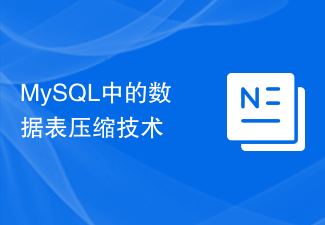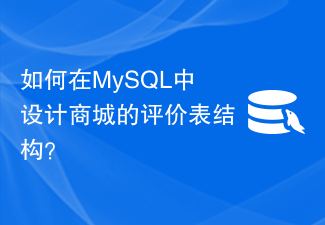 Backend Development
Backend Development PHP Tutorial
PHP Tutorial PHP tag cloud production - data table structure and query method_PHP tutorial
PHP tag cloud production - data table structure and query method_PHP tutorialPHP tag cloud production - data table structure and query method
For example: If you need an article to contain tagnames with ids 1,2,3 in the tag table, that is, tags with ids 1,2,3, MySQL中的数据表压缩技术Jun 16, 2023 am 08:16 AM
MySQL中的数据表压缩技术Jun 16, 2023 am 08:16 AMMySQL是一种常见的关系型数据库,是许多网站和应用程序的核心组件。随着数据量越来越大,如何优化MySQL的性能就变得尤为重要。其中一个关键领域是数据表的压缩,在本文中我们将介绍MySQL中的数据表压缩技术。压缩表和非压缩表MySQL中有两种类型的数据表:压缩表和非压缩表。非压缩表是MySQL默认的表类型,它使用固定长度的行格式,对数据进行存储。这意味着数据
 lambda 表达式的语法和结构有什么特点?Apr 25, 2024 pm 01:12 PM
lambda 表达式的语法和结构有什么特点?Apr 25, 2024 pm 01:12 PMLambda表达式是无名称的匿名函数,其语法为:(parameter_list)->expression。它们具有匿名性、多样性、柯里化和闭包等特点。实际应用中,Lambda表达式可用于简洁地定义函数,如求和函数sum_lambda=lambdax,y:x+y,并通过map()函数应用于列表来进行求和操作。
 html5标签head和header有什么区别Jan 17, 2022 am 11:10 AM
html5标签head和header有什么区别Jan 17, 2022 am 11:10 AM区别:1、head标签用于定义文档头部,它是所有头部元素的容器,而header标签用于定义文档的页眉(介绍信息);2、浏览器都支持head标签,而旧版本浏览器均不支持header标签,需要IE9+以上浏览器才支持header标签。
 深入解析MySQL.proc表的结构及用途Mar 15, 2024 pm 02:36 PM
深入解析MySQL.proc表的结构及用途Mar 15, 2024 pm 02:36 PMMySQL.proc表是MySQL数据库中存储存储过程和函数信息的系统表,通过深入了解其结构及用途,可以更好地理解存储过程和函数在MySQL中的运行机制,并进行相关的管理和优化。下面将详细解析MySQL.proc表的结构及用途,并提供具体的代码示例。1.MySQL.proc表的结构MySQL.proc表是一个系统表,存储了所有存储过程和函数的定义和相关信息
 internet的基本结构与技术起源于什么Dec 15, 2020 pm 04:48 PM
internet的基本结构与技术起源于什么Dec 15, 2020 pm 04:48 PMinternet的基本结构与技术起源于ARPANET。ARPANET是计算机网络技术发展中的一个里程碑,它的研究成果对促进网络技术的发展起到了重要的作用,并未internet的形成奠定了基础。arpanet(阿帕网)为美国国防部高级研究计划署开发的世界上第一个运营的封包交换网络,它是全球互联网的始祖。
 mysql修改数据表名Jun 20, 2023 pm 05:52 PM
mysql修改数据表名Jun 20, 2023 pm 05:52 PMMySQL修改数据表:1、首先查看数据库中所有的表,代码为:“SHOW TABLES;”;2、修改表名,代码为:“ALTER TABLE 旧表名 RENAME [TO] 新表名;”。3、检查表名是否修改成功,代码为:“SHOW TABLES;”
 如何使用HTML和CSS实现一个具有固定导航菜单的布局Oct 26, 2023 am 11:02 AM
如何使用HTML和CSS实现一个具有固定导航菜单的布局Oct 26, 2023 am 11:02 AM如何使用HTML和CSS实现一个具有固定导航菜单的布局在现代网页设计中,固定导航菜单是常见的布局之一。它可以使导航菜单始终保持在页面顶部或侧边,使用户可以方便地浏览网页内容。本文将介绍如何使用HTML和CSS实现一个具有固定导航菜单的布局,并提供具体的代码示例。首先,需要创建一个HTML结构来呈现网页的内容和导航菜单。以下是一个简单的示例
 如何在MySQL中设计商城的评价表结构?Oct 31, 2023 am 08:27 AM
如何在MySQL中设计商城的评价表结构?Oct 31, 2023 am 08:27 AM如何在MySQL中设计商城的评价表结构?在一个商城系统中,评价是非常重要的功能之一。评价不仅可以提供给其他用户参考,还可以帮助商家了解用户对商品的反馈和意见。设计一个合理的评价表结构对于商城系统的运行和用户体验至关重要。本文将介绍如何在MySQL中设计商城的评价表结构,并提供具体的代码示例。首先,我们需要建立两个基本的表:商品表和用户表。商品表(produc


Hot AI Tools

Undresser.AI Undress
AI-powered app for creating realistic nude photos

AI Clothes Remover
Online AI tool for removing clothes from photos.

Undress AI Tool
Undress images for free

Clothoff.io
AI clothes remover

AI Hentai Generator
Generate AI Hentai for free.

Hot Article

Hot Tools

Atom editor mac version download
The most popular open source editor

VSCode Windows 64-bit Download
A free and powerful IDE editor launched by Microsoft

MinGW - Minimalist GNU for Windows
This project is in the process of being migrated to osdn.net/projects/mingw, you can continue to follow us there. MinGW: A native Windows port of the GNU Compiler Collection (GCC), freely distributable import libraries and header files for building native Windows applications; includes extensions to the MSVC runtime to support C99 functionality. All MinGW software can run on 64-bit Windows platforms.

SublimeText3 Linux new version
SublimeText3 Linux latest version

mPDF
mPDF is a PHP library that can generate PDF files from UTF-8 encoded HTML. The original author, Ian Back, wrote mPDF to output PDF files "on the fly" from his website and handle different languages. It is slower than original scripts like HTML2FPDF and produces larger files when using Unicode fonts, but supports CSS styles etc. and has a lot of enhancements. Supports almost all languages, including RTL (Arabic and Hebrew) and CJK (Chinese, Japanese and Korean). Supports nested block-level elements (such as P, DIV),






